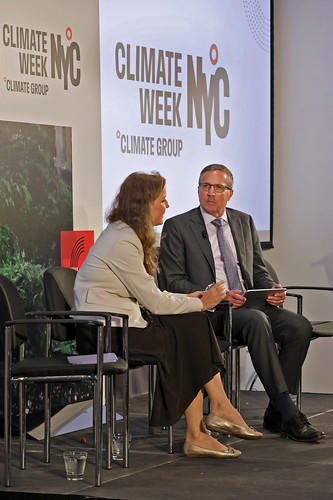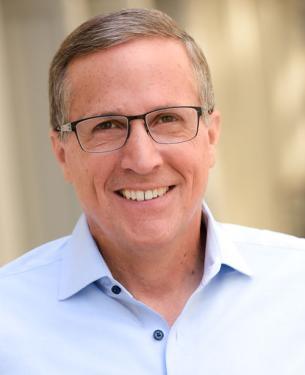I always find it moving to hear young people speak truth to power. When they find their voice and a platform to use it, the rest of us are compelled to listen.
Perhaps on climate change—more than any other issue—youth have found that voice and platform. Severn Cullis-Suzuki, then 12 years old, may have been the first when she captivated the audience at a United Nations climate conference in 1992. Teenagers Greta Thunberg and Vanessa Nakate added their powerful voices in halls of power in recent years. There have been many others in between and since.
I heard those voices again from two young activists with whom I shared a stage at the recent Climate Week NYC Summit. Kripa, a UNICEF USA National Youth Council Member, and Madina, a UNICEF Tanzania youth advocate, told us again why their generation is so concerned about the impact of climate change on the planet they will inherit. They were passionate, articulate and inspiring in their call for action. I found it almost impossible to follow them on stage.
As powerful as these youth voices have been in requesting—and demanding—action from those in power, I have been equally moved lately by concrete actions taken by youth to address the climate crisis, often starting in their own communities. Increasingly, it is no longer their voices alone they are raising, but—impatient for action—they are now putting their own hands and feet to work.
The examples are everywhere:
- Youth in Burkina Faso are learning how to install solar panels.
- In Mongolia, young people are tracking air pollution, issuing warnings and providing information to families on clear alternatives for heating their homes.
- In Lebanon, teenagers are setting up systems to turn biowaste into fuel.
- Young people in Burundi are building clean energy stoves to save trees and reduce local air pollution.
- In India, youth volunteers in the most water-stressed states are being trained in conservation practices.
- From Cambodia to Kazakhstan, youth are taking aim at single-use plastics.
These are all projects being showcased in UNICEF’s new Green Rising initiative, which aims to mobilize 10 million young people to take concrete climate actions in their communities and countries by 2025. Imagine the power of that collective action! It will be something to see.
We know from surveying youth around the world that sitting on the sidelines is no longer enough. They want to act. We also understand they often feel they lack the ideas, opportunities or training to move forward.
At UNICEF USA, we’ve recently completed a survey of youth in 15 countries to learn how they are feeling about the climate crisis. We found a big gap between the percentage of youth who believe the climate crisis can be tackled—66% of our respondents—and those who are taking action to do something about it—only 16% of respondents. What’s more, 57% of those surveyed reported feeling “eco-anxious” or concerned about the growing impacts of climate change.
What we want to prevent is eco-anxiety turning into apathy, something that would only increase that action gap. We need to create a pathway for eco-optimism by giving youth platforms and tools to act.
The Green Rising is one effort to inspire and support young people to take action. Another effort is focused on what we are calling “green skilling”—preparing youth for jobs in the growing green economy. In our survey, green jobs ranked first among the climate solutions that young people want to see.
One such project addressing this need is a joint effort between UNICEF, Generation Unlimited and a corporate partner, SAP, to build off its “Educate to Employ Initiative” where youth learn foundational knowledge, digital skills and leadership principles to start their careers in jobs within the SAP ecosystem and beyond. The program will be working in Kenya, Nigeria, South Africa and the Philippines to prepare youth for employment in the digital and green economies.
Back in 1992, Severn used her voice to deliver a message that has been echoed through the years by youth activists: “You must change your ways,” she told delegates at the climate conference. “Losing my future is not like losing an election or a few points on the stock market.”
The world needs that voice from young people.
In 2023, Rahaf, a youth climate leader with a UNICEF-supported program in Jordan is working to clean up the environment in her community. "A group of us have come up with a recycling project that empowers local women. We work with 100 women from the southern Shuna area to teach them about the environmental consequences of dumping rubbish and how to recycle materials like paper, cardboard and tin. We help them to exchange the materials for cash, which gives them a better sense of the value of these resources."
The world needs that kind of action from young people. When tens of millions of Rahaf’s are creating positive change in their communities, we’ll all be eco-optimists.
UNICEF USA is a Stream Partner at Climate Week NYC. Catch up on all the action from the week on demand here.

